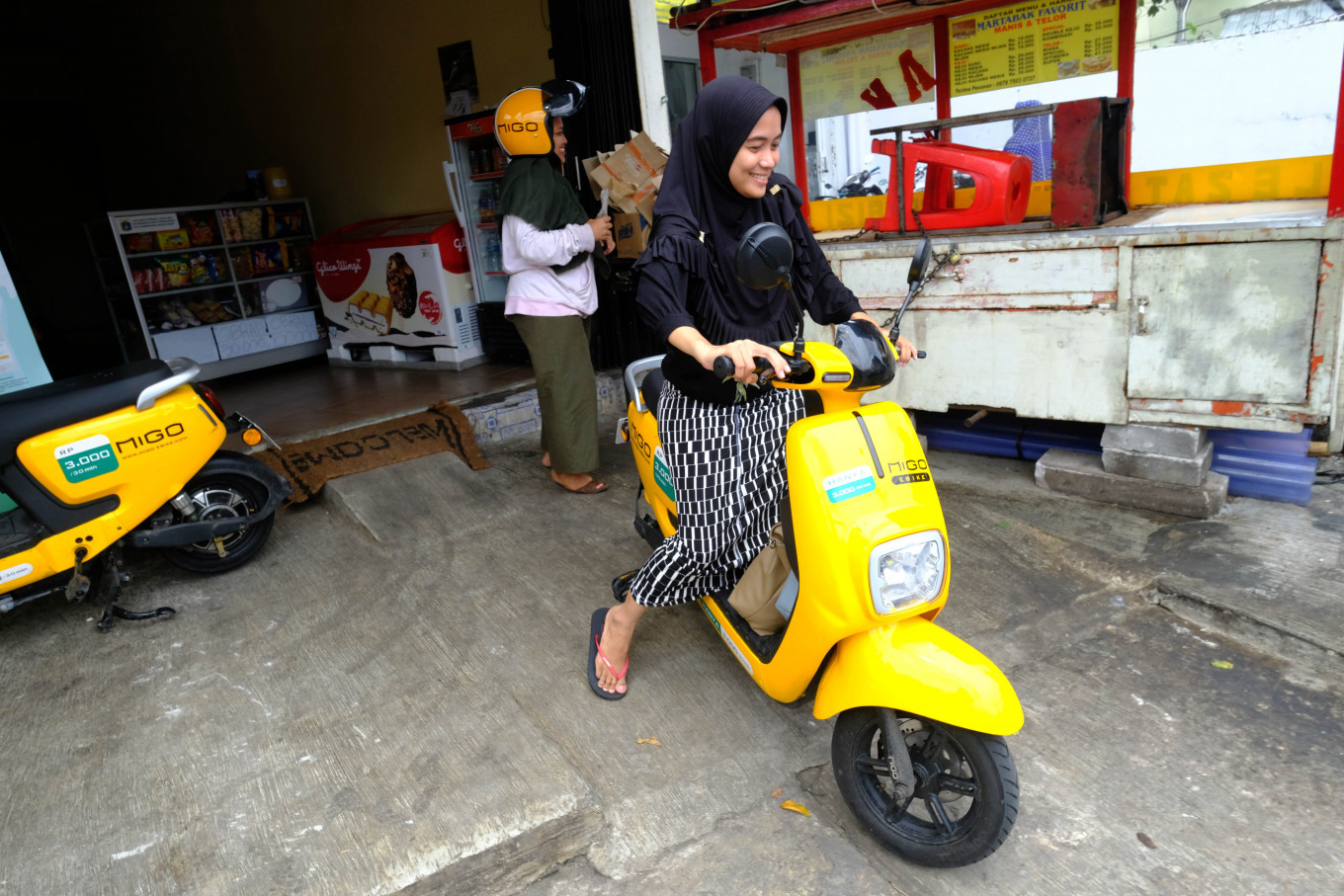Popular Reads
Top Results
Can't find what you're looking for?
View all search resultsPopular Reads
Top Results
Can't find what you're looking for?
View all search resultsConsumers’ concerns hamper electric vehicle adoption in Indonesia: Experts
People think twice about buying a car, especially an electric one, a researcher noted during a webinar hosted by the National Development Planning Agency.
Change text size
Gift Premium Articles
to Anyone
T
he government’s target for mass adoption of electric vehicles (EV) in Indonesia is facing challenges amid consumers’ concerns about technology and pricing, in addition to the pandemic having battered vehicle demand in general.
Mandiri Institute senior research specialist Andre Simangunsong said that, under the current depressed economic conditions, people would think long and hard about purchasing a car, especially an EV.
“People think twice about buying a car, and maybe two more times about buying a car with a technology they may not be familiar with,” Andre noted during a webinar hosted by the National Development Planning Agency (Bappenas) on Wednesday.
“The process of economic recovery and developing a more environmentally-friendly automotive industry have to go hand in hand,” Andre added.
Indonesia’s economy shrank by 5.32 percent year-on-year (yoy) in this year’s second quarter, according to Statistics Indonesia (BPS). Over the same period, car production fell by a staggering 85.02 percent yoy to around 41,500 units, the agency data also showed.
On the demand side, the Association of Indonesian Automotive Manufacturers (Gaikindo) recorded around 323,400 cars being sold between January and August, down more than 50 percent from 661,000 units sold during the same period last year.
Meanwhile, the government has set an ambitious target in developing EVs. Under President Joko “Jokowi” Widodo’s administration, it expects the local automotive industry to begin domestic EV production by 2021 or 2022 to reach the target of exporting 200,000 electric cars by 2025. The number accounts for around 20 percent of the expected total of 1 million cars exported a year.
Jokowi has issued Presidential Regulation No. 55/2019 that regulates and incentivizes the EV industry to spur its growth.
Read also: Indonesia needs 31,000 charging stations to reach electric vehicle goals
Danareksa chief economist Moekti Prasetiani Soejachmoen said during the webinar that consumers still held reservations about the use of EVs, including running out of power as the top concern, followed by a lack of charging stations, as well as high prices, citing a survey conducted by Pertamina Energy Institute.
Electric cars cost three times as much as their fossil fuel-powered counterparts, while electric motorcycles cost 1.5 times as much, according to a study by Jakarta-based energy think tank the Institute for Essential Services Reform (IESR).
The Industry Ministry’s metals, machinery, transport equipment and electronics industry director general, Taufiek Bawazier, confirmed the issue about EV prices.
“Indeed, the price for EVs is still very high, the case is similar abroad,” Taufiek said during the webinar, adding that rolling out stimulus to boost demand was “a big task” for the government.
“Right now, there are already efforts to zero out local tax for EV,” Taufiek noted.
Meanwhile, state-owned electricity firm PLN has estimated that private and public players would need to invest Rp 54.6 trillion (US$3.7 billion) to install more than 31,000 commercial charging stations by 2030 to reach the government’s EV goals.
PLN technology vice president Zainal Arifin said on Sept. 1 that the stations would mainly cater to commercial always-on-the-go vehicles, such as taxis, buses and online motorcycle taxis, while personal vehicles could charge when parked at home.
“To push [the adoption of] EV, we need to build the ecosystem,” Atong Soekirman, assistant to the Office of the Coordinating Economic Minister’s undersecretary for industrial development, said during the webinar.
Aside from the lack of charging stations, Atong noted standardization as another point of concern. EV charger plug-ins had to be standardized to prevent incompatibilities in charging stations, he said.
A study by Climate Transparency titled The Role of Electric Vehicles in Decarbonizing Indonesia’s Road Transport Sector and published in March this year, highlights a number of policy measures to foster the use of EV in the country.
Aside from increasing public charging infrastructure and transforming tax schemes, the study notes that providing other incentives for EV users, such as road toll exemptions, free parking, exemption from the odd-even policy and others could also be implemented to encourage the usage of EVs.










